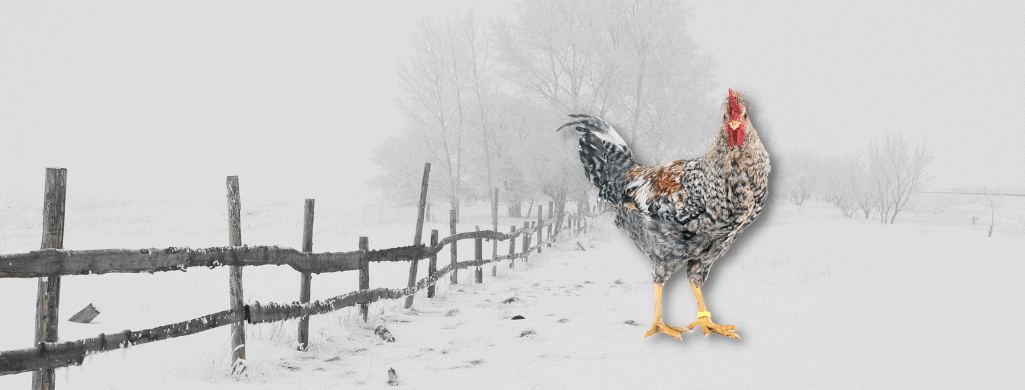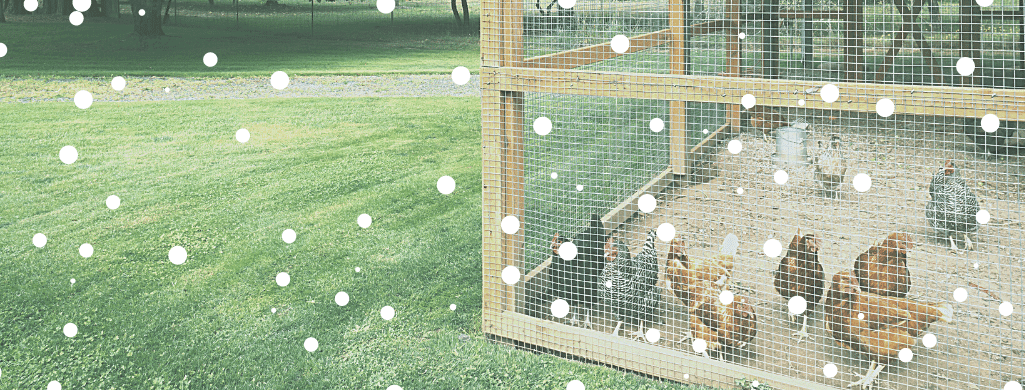When I was a kid, my mom always pointed out the different birds in the Murray McMurray magazine.
“Let’s get one of those!” I would say excitedly at every chicken breed she showed me.
Sometimes she said yes. But sometimes, she said, “This kind of chicken has a hard time in the winter.”
Choosing tough birds for your mixed flock is crucial if you live in a cold climate.
Do Cream Legbars fit in your flock? Are they cold-hardy enough to make it?
Cream Legbar chickens are cold-hardy and do well in the winter. They are generally healthy birds and less likely than other breeds to get sick in the cold. Some hens of this breed are winter layers, too. This changes on a bird-to-bird basis, though, and is unpredictable.
Let’s discuss how to help these birds in the winter and what to watch for.

Table of Contents
ToggleAre Cream Legbars Winter Layers?
Cream Legbar chickens can handle temperatures down to 32° degrees Fahrenheit (0° C) well. Lower temperatures are OK in small amounts, but keep their coops warm.
Cream Legbars are one of only a few blue egg layers on the market, not to mention prolific layers in general.
But do they continue laying in the colder months?
Some Cream Legbar hens tolerate the cold winter climate with grace. Others can stay healthy but can’t keep producing eggs for you.
If you’re raising many adorable birds of this breed, someone in your flock will probably lay all winter.
This means you will keep seeing their pretty blue egg color all winter.
But if you only keep one or two Cream Legbars, your birds might quit when things cool off.
We can tell you that cold weather is tough on first-time layers.
Cream Legbars will start their egg-laying around the 5-6 month mark.
But if they reach this age in the winter, they often take longer to produce their first egg.
The chicken habitat in your yard or farm has a huge influence over your chickens’ production, no matter the breed of bird.
You obviously don’t control the weather, so pick your chicken breeds wisely instead!

Preparing Your Chicken Coop for Winter
Regardless of how cold-hardy your mixed-breed flock is, your winter layers need your help to stay healthy.
Don’t expose your friendly chickens to the cold for too long!
Here’s how to prep your coop for winter:
- Cover windows
- Repair holes
- Get a thermometer
- Consider a heater
Insulation
Backyard chicken keepers in New England know how important it is to insulate your coop in the winter.
When I was small, our yearly ritual was to use a staple gun and secure plastic over the chicken-wire windows.
Use what you have, but be sure to make the coop nice and warm!
The same goes for making repairs. Do a sweep of the chicken coop and cover any holes you see with whatever you have.
Climate Control
Installing a thermometer in your coop is an easy way to care for your chickens.
You’ll know if it starts to get too cold (or hot) for them.
This gives you more time to warm up or cool down the coop before your chickens get sick.
Here’s a thermometer we like on Amazon.
The display is super easy to read, and it shows humidity as well as temperature. We especially like it because it’s pretty inexpensive.
It has a max temperature of 122° degrees (50° C), though. So, if you need something with a higher maximum, this one’s not for you.
When you notice the coop temperature is consistently low, it’s time to take action.
Consider putting a heater like this one in your coop to help regulate the temperature.
We recommend this particular heater because it was made with chickens in mind and is designed to be safe for birds.
It’s in the same price range as most coop heaters. But it’s about twice as expensive as a heat lamp.

Are Cream Legbar Chickens Heat Tolerant?
Conversely, living in a hot climate is hard on many backyard chicken breeds.
Cream Legbars take the heat well.
These tough birds are perfect for a colder climate as well as a warmer one.
Despite their big multi-color plumage, Legbars don’t overheat as quickly as other chicken breeds.
Perhaps they have this awesome trait because of their relation to the Plymouth Rock, another heat-tolerant and cold-hardy bird.
To help them stay cool in the summer months, give your flock of all varieties cold water and ample shade.
Having access to water at all times is critical, especially when it’s hot outside.
Cream Legbars, much like White Leghorns and Brown Leghorns, are avid foragers. But staying active and looking for food is tough on them in the summer heat.
Taking breaks to drink cold water will be a necessity for your foragers.
Are Cream Legbars Healthy Chickens?
For the most part, Cream Legbars are healthy layers.
But their comb type puts them at risk of frostbite during harsh winters.
This breed of chicken has large-size single combs, which are adorable. However, their large floppy combs are easily frostbitten.
Cream Legbar roosters are at an even higher risk of frostbite than hens because they have the same comb type and bigger wattles!
If you live in a very cold climate and don’t want to raise males at all, here’s how to tell these autosexing chicks apart from a young age.
Female chicks have dark marks on their backs.
Your other chicks will have lighter bodies and a light-colored spot on the back of their heads. Any baby chick with this head spot is a roo.
Planning to raise Legbars in the winter?
Here’s how to protect them from frostbite:
- Use a heater
- Offer warm water
- Clear away snow/water
You need to help your birds maintain their body heat, stay healthy, and dry.
These things will lower the risk of frostbite.
Much Ado About Winter
Cream Legbar chickens are cold-hardy, heat tolerant, all-around tough birds.
Their large-size single combs make them susceptible to frostbite, though.
Read more about their egg-laying habits in our article on when Cream Legbar chickens start laying and what to expect.
How useful was this post?
Click on a star to rate it!
We are sorry that this post was not useful for you!
Let us improve this post!
Tell us how we can improve this post?
